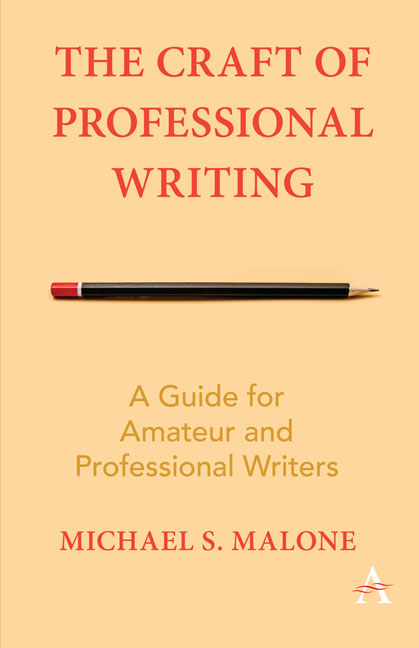Book contents
- Frontmatter
- Dedication
- Contents
- Introduction
- Part One Basics
- Part Two Corporate Careers and Disciplines
- Part Three Writing Careers in Media
- 8 Blogger
- 9 News Reporter
- 10 Critic
- 11 Essayist
- 12 Book Author
- 13 Television and Radio News Reporter
- 14 Screenwriter and Playwright
- 15 Fiction Writer and Novelist
- 16 Academic Track
- 17 Miscellaneous Writing
- Part Four The Work of Professional Writing
- Further Reading
- Suggested Assignments
- Index
12 - Book Author
from Part Three - Writing Careers in Media
- Frontmatter
- Dedication
- Contents
- Introduction
- Part One Basics
- Part Two Corporate Careers and Disciplines
- Part Three Writing Careers in Media
- 8 Blogger
- 9 News Reporter
- 10 Critic
- 11 Essayist
- 12 Book Author
- 13 Television and Radio News Reporter
- 14 Screenwriter and Playwright
- 15 Fiction Writer and Novelist
- 16 Academic Track
- 17 Miscellaneous Writing
- Part Four The Work of Professional Writing
- Further Reading
- Suggested Assignments
- Index
Summary
What is book authorship?
The authoring, co- authoring or compiling and introducing of a fulllength (40K to 300K word count) hardcover, softcover or electronic nonfiction book. Such a book typically takes 12– 15 months to complete, of which the actual writing is about 9 months. Time to publication after completion of the writing can range from days (e- books) to more than a year (traditional hardcover publishers). For the purposes of this book, we distinguish “author,” which we will use for nonfiction books only, and “novelist,” a term used exclusively for fiction.
Why write nonfiction books?
Because some subjects are of sufficient importance and complexity that they can only be treated at book length. Also, putting one's work between covers confers on it a value and gravity impossible in any other publication format. Finally, more than any magazine or newspaper article, books are substantial physical objects that can endure for years, even generations.
Types of books
The range of subjects for nonfiction books is as wide as the range of human interests. In other words, it is almost infinite. Here is a partial list of broad topics. Under each topic you can probably create a list of subtopics just as long. The point is that, especially in the modern global marketplace, there are probably enough potential readers in each of thousands of subgenres of nonfiction to make it commercially viable for you to write a book on that subject. And if you are willing to write out of love (or for reputation building) instead of money, the potential topics are probably ten times that.
The book-writing process
Writing a book is a major effort, one that can take thousands of hours and months out of your life. Too many people become obsessed with an idea for a book, sit down and just start writing from page one, devoting many hours per day for the first couple of weeks. This is a recipe for disaster— which is why only a small fraction of books started are ever finished. Most often, these writers simply burn themselves out. Or other responsibilities call, and they abandon the effort. Or they discover they don't have enough material for a book- length work.
- Type
- Chapter
- Information
- The Craft of Professional WritingA Guide for Amateur and Professional Writers, pp. 173 - 194Publisher: Anthem PressPrint publication year: 2018



